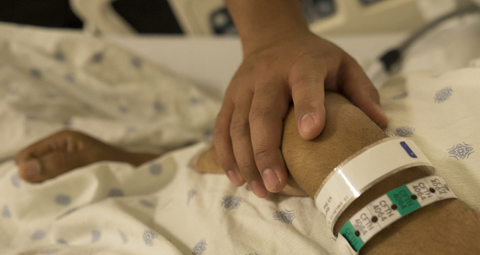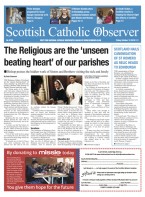October 19 | ![]() 0 COMMENTS
0 COMMENTS ![]() print
print

Touching moments at life’s end
The trust a priest is afforded at the bedsides of the sick and the dying is a humbling experience, Fr Michael Kane says.
Just a few days into my first parish appointment I remember attending my first ever sick call to a nearby care home. When I entered the room, I saw a large group of family members squashed together around the bed of an elderly woman who was weak and struggling for breath.
Once I had introduced myself, I walked to the top of the bed and was welcomed by the sick lady’s elderly husband who thanked me for coming in the middle of the night. He was sitting nearest his wife, holding her hand.
With tears in his eyes, he spoke of the wonderful 60 years of marriage they had cherished together, and the goodness of God in blessing them with a wonderful family.
Then, suddenly, he sprang from his chair, moved to the side and offered me his seat and his wife’s hand. “Thank God for our priests,” he said.
This is a scenario that has repeated itself on many occasions in my short priestly life. Visiting those who are sick and dying is part of our priestly duties. At all times, day or night, we attend to administer the Sacraments to those nearing eternity and to offer consolation to their families.
It is part of what we are called to do: to bring the message of Christ, in all its richness, into those difficult and painful moments of life. In these moments of darkness, we offer the hope of the Gospel and promise to prepare Christian souls to meet the Lord.
Yet, I am still moved by the willingness of people to assign a priest a place of tremendous privilege and intimacy in the midst of these critical moments. That a husband or wife should invite the priest, a relative stranger, to hold the hand of their loved one, in place of a spouse or a child, is a truly humbling experience.
On another occasion, I remember a family telling me how blessed they felt that their father died holding the hand of a priest. It seemed strange to me at the time that they would not rather have preferred the family to occupy such a sacred space. But I had missed the point.
So why, we might ask, is a ‘man of the cloth’ given this privileged access? Why, in an age when priestly failings have become all too apparent, is such trust placed in our hands?
In truth, the answer has little to do with who we are. It is little to do with our bedside manner or demeanour or personal skills. The same warmth is extended to priests in general, no matter our pastoral temperament.
Instead, it is all to do with the One whose name we proclaim. People want to come closer to God through the presence and actions of the priest.
In particular, when visiting the sick and dying, this means offering the Sacraments of healing, primarily Absolution, Anointing of the Sick and Holy Communion, known as Viaticum. People also seek the blessing of God through the hands of the priest, as a sign of the Lord’s closeness and concern in their time of need.
Still, today, I am moved by the trust that people place in their priests. It is a unique relationship, perhaps unlike any other in the world. People trust us and confide in us and support us and love us simply because we are their priest.
Catholics instinctively understand that we are here with them and for them. They understand that priests have forsaken the intimacy of family life, privacy and the trappings of the world, to be there for them. They know that they will always receive a welcome at our door.
This description is not intended to summarily canonise all priests. Neither is it written in a spirit of clericalism, hoping to place priests on a pedestal. We all know the fragility and brokenness of priests. Yet, God continues to sustain priestly life as a source of tremendous grace for the life of the Church.
One of my great inspirations is St Jean Marie Vianney, the Curé of Ars, the patron saint of parish priests. He was a humble and simple priest but never hid the glory of his vocation as an alter Christus, ‘another Christ,’ and a man who is called to radiate God in his life.
I end with his words of wisdom: “O how great is the priest! If he realised what he is, he would die… God obeys him: he utters a few words and the Lord descends from Heaven at his voice, to be contained within a small host.
“Without the Sacrament of Holy Orders, we would not have the Lord. Who put him there in the tabernacle? The priest. Who welcomed your soul at the beginning of life? The priest. Who feeds your soul and gives it strength for the journey? The priest.
Who will prepare it to appear before God, bathing it one last time in the blood of Jesus Christ? The priest—always the priest. […] After God, the priest is everything. Only in Heaven will he fully realise what he is.”











